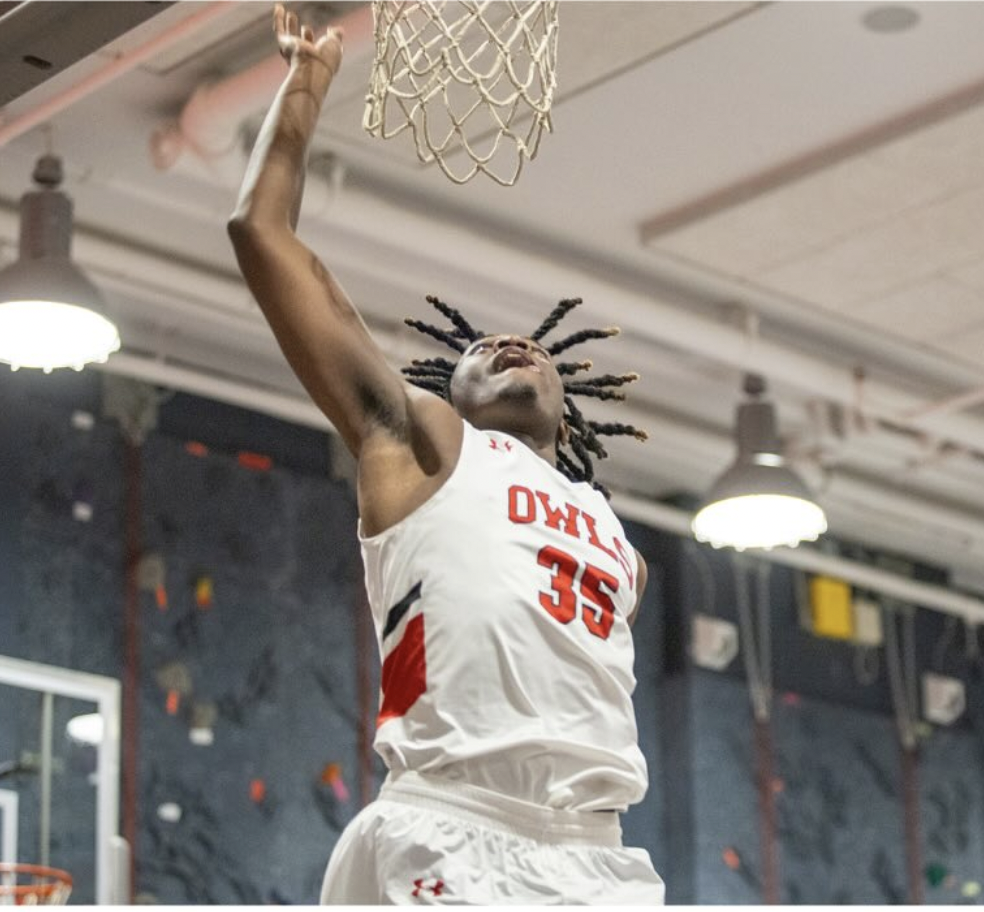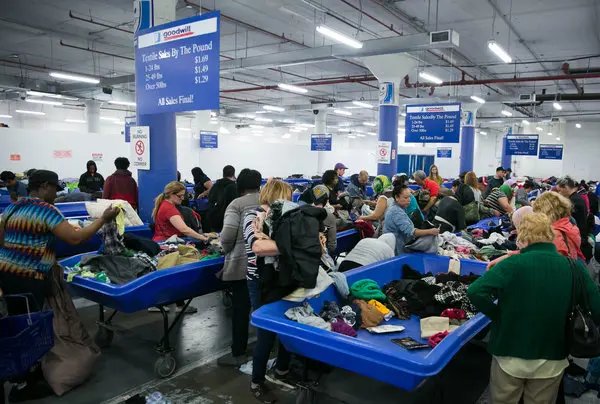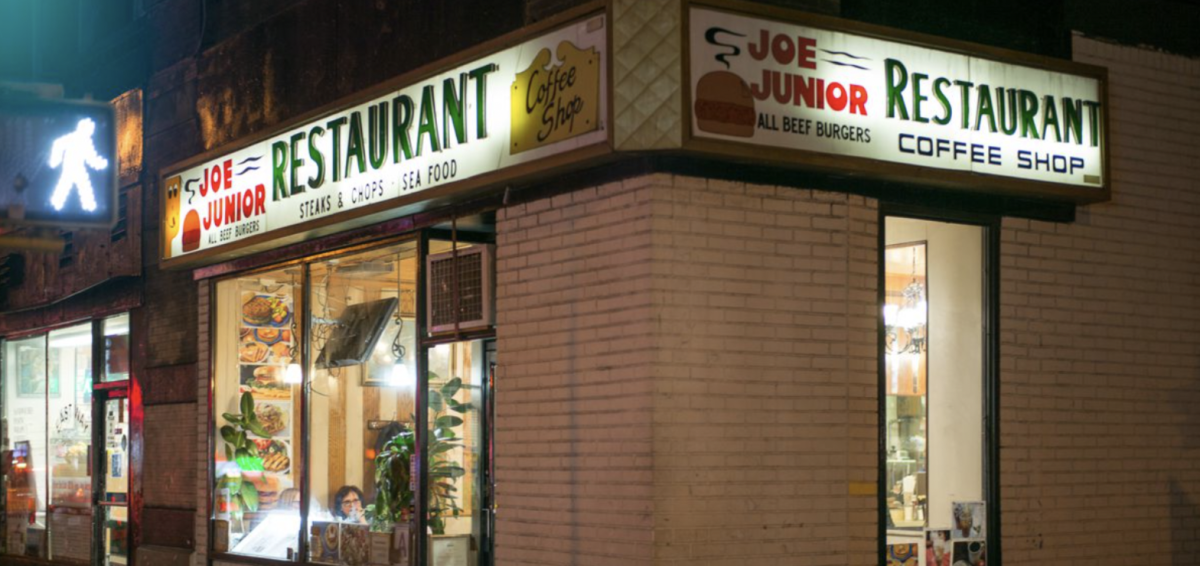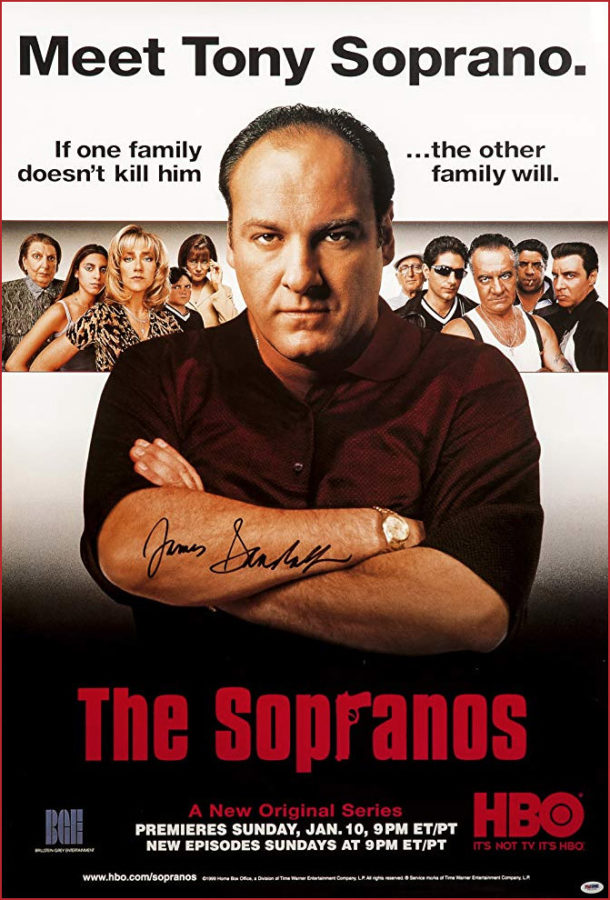Students Review Sopranos Series
Poster for the first season of The Sopranos
March 4, 2022
This article contains a few minor spoilers for The Sopranos. However, they should not inhibit those new to the series to enjoy watching it.
In January of 1999, the most influential and arguably the greatest television show of all time aired for the first time. HBO’s The Sopranos, written by David Chase and starring James Gandolfini, changed television forever. The Sopranos follows protagonist Tony Soprano as he tries to find happiness while balancing his home life with his career as a high-profile mob boss. Although he commits unspeakable crimes, the audience is able to empathize with his troubled character. The use of an anti-hero as the protagonist in television inspired many other acclaimed television series such as Breaking Bad, The Wire, and Dexter. Throughout the 6 seasons of the show, David Chase explores the themes of depression, mentorship, betrayal, addiction, family, life’s purpose, the American dream, and Italian-American identity. The Sopranos takes a deeper look at the post-golden age of the mob, when there is no longer any glory or honor associated with the mafia’s crimes. With the combination of comedic, but deep and thematic writing, shocking twists, and a perfect cast, the Sopranos stakes its claim for one of the best shows ever created. In this article, we will be ranking and reviewing the seasons of the show.
Season 1
In one of the most beloved seasons of the show, we enter the underworld of the mob through the mind of New Jersey mobster, Tony Soprano. At the start of the show, Tony is a captain of the DiMeo crime family. When the acting boss of the family, Jackie Aprile, gets diagnosed with cancer, Tony’s responsibilities are increased. This development leads tensions to rise between Tony and his uncle, Corrado “Junior” Soprano over who will become Jackie’s successor as boss when he passes. Tony’s anxiety also increases as he tries to place his aging mother, Livia, in a retirement community. Throughout the season, we get to see how Livia’s cynicism and lack of support as a parent affect Tony. We watch him deal with the problems of his adolescent kids, AJ and Meadow, as he tries to hide the truth of his mob life from them. These combined stresses ultimately cause Tony to have panic attacks and meet with a psychiatrist. For mobsters, meeting with a physiatrist is against the rules, as the family business is not to be spoken about with outsiders. This makes Tony’s meetings with Dr. Jennifer Melfi all the more interesting, as he reveals his true feelings about life, albeit covered with a layer of obfuscation and dishonesty. Through Dr. Melfi we get a passageway into Tony’s brain, and learn about his nihilistic philosophies and mental struggles. Dr. Melfi also helps to interpret Tony’s strange dreams, which we often get to see through surreal and unsettling dream sequences. Season 1 is a disturbing, tense, consistent, and surprisingly funny beginning to the Sopranos that perfectly introduces characters and instantly hooks audiences into the show.
–Lewis
Notable Episodes:
Pilot
College
Meadowlands
I Dream of Jeannie Cusamano
Season 2
Season 2 picks up where its predecessor left off, keeping the balance of violent crime and American family life while continuing to push the boundaries of what can be put on the small screen. Two major characters are added this season: Richie Aprile, a recently freed captain , and Janice, Tony’s self-centered and obnoxious sister that beautifully ruins every social situation she enters. Both characters reflect off of Tony in fascinating ways, with Aprile contrasting with Tony’s more empathetic side, while Janice reflects many of his and his mother’s worst characteristics. In addition, other major characters are expanded upon by new developments in their lives, such as Sal Bonpensiero, a fellow mobster, becoming an FBI informant, and Tony’s uncle Junior being placed under house arrest. Christopher Moltisanti sees the most character development, mostly through his violent engagement to Adriana, his being “made” (a term used to describe his initiation into the mafia), and his use of two associates as punching bags. Both of these plotlines depict Christopher trying to gain power and control, often aggressively and violently, which becomes a prevalent pattern in later seasons. These side plots flesh out the world of The Sopranos, as well as set up important moments in this and later seasons. Season two is also when the series starts to experiment more with its narrative structure, incorporating more flashbacks and dream sequences. Like many seasons and episodes of The Sopranos, season two can drag a bit during its early parts. However, the season crescendos into some of the show’s best offerings, with its final two episodes being all-time classics. While lacking the consistency and unity of the first season, the second season of the Sopranos expands on the show’s revolutionary formula and paves the way for other seasons to broaden Tony’s struggles with finding satisfaction in a broken life.
–Zach
Notable Episodes
The Knight in White Satin Armor
Funhouse
From Where to Eternity
Season 3
Season 3 continued to break television’s barriers, holding some of the show’s most brutal moments. We meet ruthless gangster Ralph Cifaretto as he returns from Miami. Following in the footsteps of Richie Aprile, Ralphie’s impulsive behavior and lack of respect for Tony bring additional anxiety to Tony’s already hectic life. Similar to Richie, Ralphie feels as if he is entitled to a higher position in the mob, and throughout the season, he pressures Tony to be bumped to captain of the Aprile crew. On top of dealing with Ralphie, Tony has to deal with an increasingly misbehaved AJ and a mistress with psychiatric issues, Gloria Trillo. Season 3 also begins to focus more on Meadow and her relationships. As she spends her first year at Columbia University, she dates the pretentious Noah before falling in love with Jackie Aprile’s son, Jackie Junior. While Jackie Aprile never wanted his son to be involved in the mob life, Jackie Junior. fails to honor his fathers wishes. Although the plotlines of season 3 are not as eye-catching as those of other seasons, the individual episodes are always extremely captivating. In the show’s most famous episode, The Pine Barrens, Paulie Gaultieri and Christopher Moltisanti make magic as they try to chase down a Russian man who owes Silvio money. The season finale culminates in AJ fainting, bringing Tony to the realization that AJ’s erratic and rebellious behavior is Tony’s fault. Tony passed down those “rotten putrid Soprano genes” that contaminated his son. In season 3, the show begins to take a dark turn as Tony further struggles to find happiness with his life.
–Lewis
Notable Episodes
University
Employee of the Month
The Pine Barrens
Amour Fou
Season 4
Out of all of its six seasons, The Sopranos’ fourth feels the most like a collection of episodes rather than a cohesive narrative with a clear beginning to end. However, the plotlines are just as entertaining as the rest of the show. The most notable of these is with Ralphie Cifaretto, who breaks down emotionally after one of his sons is injured. It is powerful to see the showrunners inject visceral empathy into Ralphie, the epitome of unlikability and ruthlessness. His ensuing fight with Tony is also one of the most memorable scenes in the show. The themes of anguish and loss (both interpersonal and material) in Ralphie’s storyline are present throughout the season, with Bobby Baccala’s wife’s death and Tony’s financial struggles being central to this season’s story. The plotline of the family’s new racehorse, Pie-Oh-My, touches on both monetary and personal loss, but is stretched out too long and drags the pace of the early part of the season. The New York Mob is also introduced in season 4, which takes up many of the B plots of this season’s episodes, but only really starts to impact the show in season 5. The biggest problem with this season is that these themes are not entirely connected with its ending, which focuses on Tony and Carmela’s marital issues. This shift in tone during the ending makes the season feel less thematically cohesive in comparison to other seasons (eg. Season 1’s subversion of the typical American family, and season six’s emphasis on the death of the mob), and makes some of its better plotlines harder to remember. That being said, the aforementioned season finale is a fantastic episode, featuring Edie Falco’s masterful performance as Carmela Soprano reaching its pinnacle. Although the quality of the fourth season of The Sopranos is as high as the rest of the show, its lack of cohesiveness and memorability puts it in the bottom half of our ranking.
–Zach
Notable Episodes
Whoever Did This
Whitecaps
The Strong, Silent Type
Season 5
In our pick for the best season of the Sopranos, multiple significant characters come back from prison and cause trouble for Tony. Tony’s beloved cousin, ex-mobster Tony Blundetto, follows a compelling character arc as he tries to go straight as a masseur. However, Blundetto’s jealousy of Tony’s success causes him to re-enter the life of crime. Tensions rise between the New York and New Jersey families when a Lupertazzi family captain, Phil Leotardo, is freed after 20 years in prison. After Tony Blundetto shoots Phil’s kid brother, Billy Leotardo, Tony and Lupertazzi family boss, John Sacrimoni, struggle to keep the peace between families. Back in the Soprano household, Tony makes an effort to rekindle his relationship with Carmela after their unforgettable season 4 finale fallout. We get to see how the split affects Meadow and AJ’s behavior as they continue to grow into adulthood. The most tragic storyline of the season follows Adrianna La Cerva, Christopher Moltisanti’s loving girlfriend. After the FBI catches Adrianna on a drug charge, they make her rat on her boyfriend and the associates of the family. Adrianna tries to share as little information as she can, but an incident occurs within her nightclub and she reveals more details. The lingering threat of a mob war between New York and New Jersey and the introduction of some of the show’s most interesting characters make season 5 the best season of the Sopranos.
–Lewis
Notable Episodes
Long Term Parking
The Test Dream
Marco Polo
All Due Respect
Season 6A
*We will be considering 6A and 6B separate seasons in our review and ranking
If considered on its own, season 6A lands at the bottom of our ranking of The Sopranos’ seasons. It starts off strong, with the first episode ending in the dramatic twist of Tony’s dementia-ridden Uncle Junior shooting him and putting him into a comatose state. This event allows us to see Tony’s inner desires and fears through a series of dream sequences, as well as how his family and colleagues struggle in a world without him. However, once Tony recovers, the first part of season six falls victim to a series of boring plotlines that stretch out too long and do not contribute to the overall plot. The most notable dud of the season is Episode 7, which spends most of its hour long run time on the dull storyline of Artie’s restaurant going through trouble. There are certainly redeeming parts to the season, such as Christopher’s work on the production of the horror mafia movie Cleaver, and further development of A.J.’s character. However, despite setting important thematic backlighting for Season 6B, the twelve episodes preceding it are lackluster and make this season the least interesting part of the show
–Zach
Notable Episodes
Members Only
Join the Club
Mr. And Mrs. John Sacrimoni Request
Season 6B
In the final nine episodes of the Sopranos, the mob falls apart. The season premiere starts peacefully, with Tony, Carmela, Janice, and Bobby going on vacation in the family lakehouse. However, things take a turn when the family gets into a violent fight, and a deal with mobsters in Montreal leads to Bobby’s first murder. Things only get more morbid, with plot lines like Johnny Sack’s battle with cancer, Junior’s further fall into Dementia, A.J. ‘s struggles with mental illness and lack of success, and Christopher’s relapse and spiraling out of control. These events all involve pivotal characters in the show losing control of their lives, a common theme throughout the sub-season. The most notable plotline of this nature is A.J. ‘s intense mental breakdown, which transforms him from a whiny child in season one to one of the show’s most fleshed out and interesting characters. These plotlines of decay and despair all circle back to Tony. Although more mentally stable after recovering from his coma, he still finds himself at the center of existential crises facing his friends, family, and business. The last point of issue for Tony is Phil Leotardo’s clan’s growth in power and wreaking havoc on the Soprano family in a brutal mob war. This threat crescendos throughout the season, ending with a feeling of loneliness and dread that ripples through the series finale. Finally, although Lewis and I have tried to avoid major spoilers, it would be nearly impossible to talk about The Sopranos without mentioning its iconic final scene. Without giving it away, the final few moments of the series reflect on its themes of the meaninglessness of life, the vapidity of the American dream, family, and betrayal while keeping with the show’s signature sense of innovation. While only nine episodes long, season 6B brings a satisfying narrative and thematic end to The Sopranos.
-Zach
Notable Episodes
Made in America
Blue Comet
Kennedy and Heidi
Sopranos Home Movies
The Second Coming
Final Ranking:
7. Season 6A
6. Season 4
5.Season 3
4. Season 2
3.Season 1
2. Season 6B
1. Season 5
Top 10 Episodes:
10. I Dream of Jeannie Cusamno
9. The Test Dream
8. Whitecaps
7. College
6. The Knight in White Satin Armor
5. Made In America
4. The Pine Barrens
3. University
2. The Blue Comet
1. Long Term Parking



















